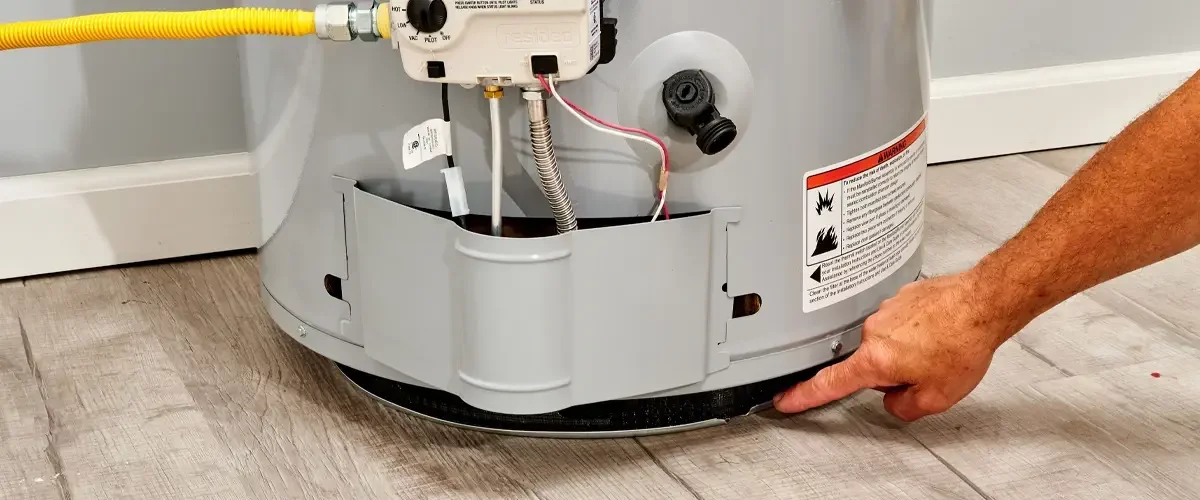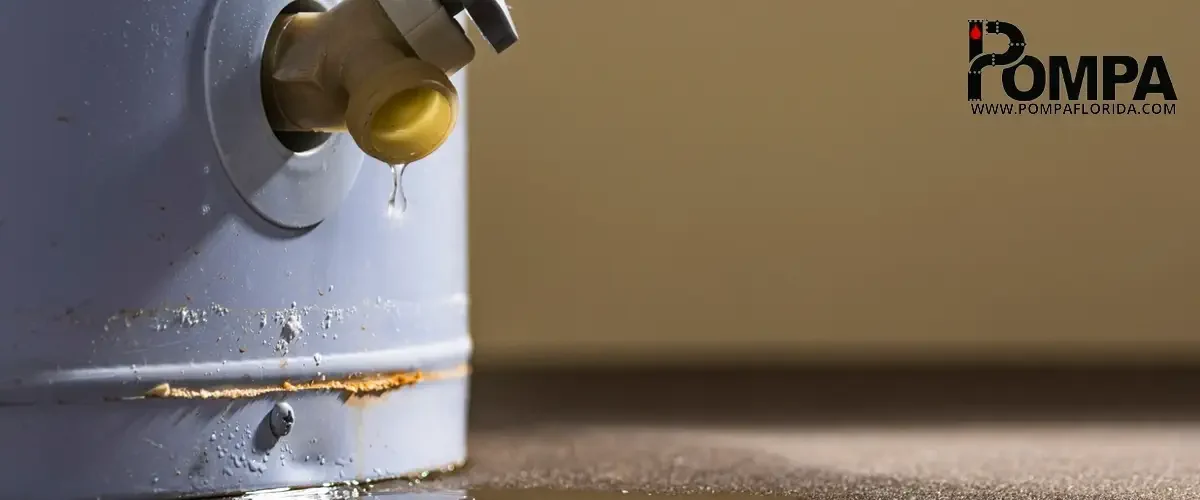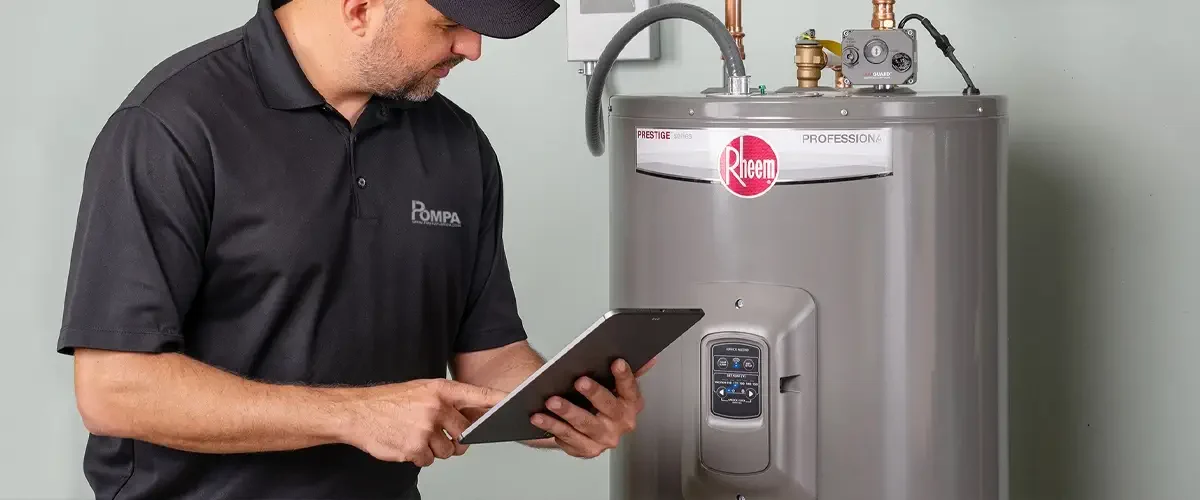Common Water Heater Leaks: Causes, Fixes, and Prevention
September 5, 2023
Your home’s water heater is a workhorse that silently provides you with warm showers, clean dishes, and hot water for various household chores. However, like any mechanical system, water heaters are not immune to issues, and water heater leaks can be a homeowner’s nightmare. These leaks can range from minor inconveniences to major problems that demand immediate attention. In this guide, we will delve deeply into the causes of common water heater leaks, explore DIY fixes you can try at home, and discuss when it’s time to call a water heater professional.
Additionally, we will provide you with valuable prevention tips to extend the lifespan of your water heater and avoid costly repairs.

Common Causes of Water Heater Leaks
Pressure Relief Valve Leak:
- Cause: The pressure relief valve is a crucial safety feature designed to release excess pressure from your water heater to prevent it from exploding. A leak from this valve typically occurs when there is too much pressure or temperature within the tank, signaling a potential hazard.
- Fix: Start by inspecting the valve for visible signs of damage or corrosion. Sometimes, gently lifting and closing the valve a few times can dislodge debris that may be causing it to leak. If the issue persists, it’s imperative to replace the valve, which is a relatively simple DIY task. However, if you’re uncomfortable with this task or if it recurs frequently, consult a water heater professional to ensure your safety.
Leaking Drain Valve:
- Cause: The drain valve, situated near the tank’s bottom, serves to flush out sediment and minerals that accumulate over time. This valve can become loose or damaged, leading to leaks.
- Fix: Start by tightening the valve carefully with a wrench to see if the leak stops. If it continues, consider replacing the valve with a new one. Always turn off the power supply and drain the tank before attempting this fix.
Corrosion and Rust:
- Cause: The interior of your water heater tank is exposed to water continuously, creating a prime environment for corrosion over time. Corrosion weakens the tank’s structure and can result in leaks.
- Fix: Unfortunately, once the tank itself is corroded, it signals that your water heater is approaching the end of its lifespan. In this case, replacing the water heater is the only long-term solution. To delay corrosion, conduct regular maintenance and follow the manufacturer’s recommendations for flushing the tank.
Faulty Pressure Regulator:
- Cause: A malfunctioning pressure regulator can cause fluctuations in water pressure, which in turn puts excessive stress on the tank and its connections, leading to leaks.
- Fix: If you suspect a faulty pressure regulator, it’s best to consult a professional plumber. They can diagnose and repair the issue, ensuring that your water pressure remains within safe limits. Attempting this fix without proper knowledge can result in further damage.
Loose or Faulty Connections:
- Cause: Over time, the connections, including pipes, fittings, and valves, can become loose due to temperature fluctuations and vibrations. Loose connections may lead to leaks.
- Fix: Inspect all connections for signs of leakage. Carefully tighten them using an appropriate wrench. Be cautious not to overtighten, as this can damage the components. If the leak persists, consult a plumber to assess and rectify the issue.
Sediment Buildup:
- Cause: Water naturally contains minerals and sediment. Over time, these particles settle at the bottom of the tank, leading to corrosion and leaks.
- Fix: Regularly flushing your water heater to remove sediment and minerals can help prevent leaks caused by buildup. Consult your manufacturer’s instructions on how to safely flush the tank or consider hiring a professional plumber for this task.

DIY Fixes for Water Heater Leaks
While some water heater leaks can be repaired by homeowners, it’s crucial to approach these fixes with caution, especially if you’re not experienced with plumbing tasks. Here are some detailed DIY fixes you can attempt:
Tightening Connections:
- Fix: Inspect all connections, such as pipes, fittings, and valves, for any loose or leaking joints. Use a wrench to carefully tighten them. Turn off the power and water supply to the heater before attempting any repairs. Inspect for leaks after tightening, but avoid over-tightening, as this can cause damage.
Replacing Valves:
- Fix: As mentioned earlier, you can try replacing the pressure relief valve or drain valve if they are the source of the leak. Always turn off the power and drain the tank before replacing any valve. Consult your water heater’s manual for specific instructions on valve replacement.
Checking Temperature Settings:
- Fix: If your water heater is set at an extremely high temperature, it can increase the pressure inside the tank and lead to leaks. Lower the temperature setting to a safe and efficient level, typically around 120 degrees Fahrenheit (49 degrees Celsius).
Flushing the Tank:
- Fix: Regularly flushing your water heater to remove sediment and minerals can help prevent leaks caused by buildup. Follow your manufacturer’s instructions on how to safely flush the tank. Flushing may require the use of a hose and a bucket to drain the sediment.
Inspecting the Anode Rod:
- Fix: The sacrificial anode rod in your water heater helps prevent corrosion by sacrificing itself to protect the tank. Have it inspected regularly and replaced when necessary. Consult your manufacturer’s guidelines for the appropriate replacement schedule.
When to Call a Water Heater Professional
While some water heater issues can be resolved by homeowners, there are situations where it’s best to seek the expertise of a professional plumber:
Severe Leaks:
- If you notice a significant or continuous leak, it’s a clear sign that something more serious is wrong with your water heater. Turn off the power and water supply to the unit and call a plumber immediately to prevent further damage or hazards.
No Hot Water:
- If your water heater isn’t producing hot water, there could be various causes, including a faulty heating element, thermostat, or gas supply. Diagnosing and fixing these issues may require professional skills and equipment.
Unusual Noises:
- Strange noises, such as popping or rumbling, could indicate sediment buildup or other internal issues. A professional can assess the situation and perform necessary maintenance or repairs.
Foul Odors:
- If your hot water smells unpleasant or like rotten eggs, it may be a sign of bacterial growth in the tank. A plumber can disinfect the tank and address the issue.
Age of the Water Heater:
- If your water heater is approaching or exceeding its expected lifespan (usually around 10-15 years for conventional tank water heaters), it’s advisable to consult a professional for an evaluation. Replacing an aging water heater can often save you from costly repairs in the long run.
Preventing Water Heater Leaks
Prevention is often the best strategy to avoid water heater leaks and ensure the longevity of your appliance. Here are some detailed prevention tips to help you maintain a leak-free water heater:
Regular Maintenance:
- Schedule annual maintenance checks by a professional plumber to inspect and service your water heater. This can catch potential issues before they become major problems. They will check for signs of corrosion, test safety features, and ensure everything is in working order.
Flushing the Tank:
- As mentioned earlier, regularly flushing your water heater to remove sediment and minerals can help prevent leaks caused by buildup. Consult your manufacturer’s instructions on how to safely flush the tank. Flushing may require the use of a hose and a bucket to drain the sediment.
Adjust Temperature Settings:
- Keep the temperature setting at a safe and energy-efficient level, around 120 degrees Fahrenheit (49 degrees Celsius). Higher temperatures can accelerate wear and tear on your water heater.
Install a Water Softener:
- If your water is particularly hard or contains a high mineral content, consider installing a water softener. This device can reduce scale buildup in your water heater, extending its lifespan and improving efficiency.
Inspect the Anode Rod:
- Regularly inspect the sacrificial anode rod and replace it when necessary. This rod helps protect your tank from corrosion by attracting corrosive elements. Consult your manufacturer’s guidelines for the appropriate replacement schedule.
Check for Signs of Corrosion:
- Periodically inspect the exterior of your water heater for any signs of corrosion, including rust or discoloration. Early detection can prevent leaks and the need for a full replacement.

Conclusion
Water heater leaks can be a source of frustration for homeowners, but having a clear understanding of their causes, along with knowing when to take action, can help you avoid more significant problems. While some minor leaks can be fixed through DIY solutions like tightening connections or replacing valves, it’s essential to recognize when a professional plumber is needed to address severe leaks or other complex issues.
By conducting regular maintenance and following these detailed preventive measures, you can keep your water heater in excellent condition, ensuring you have a reliable source of hot water for years to come. Staying vigilant and proactive can save you both time and money, minimizing the inconvenience and expense of unexpected leaks.


